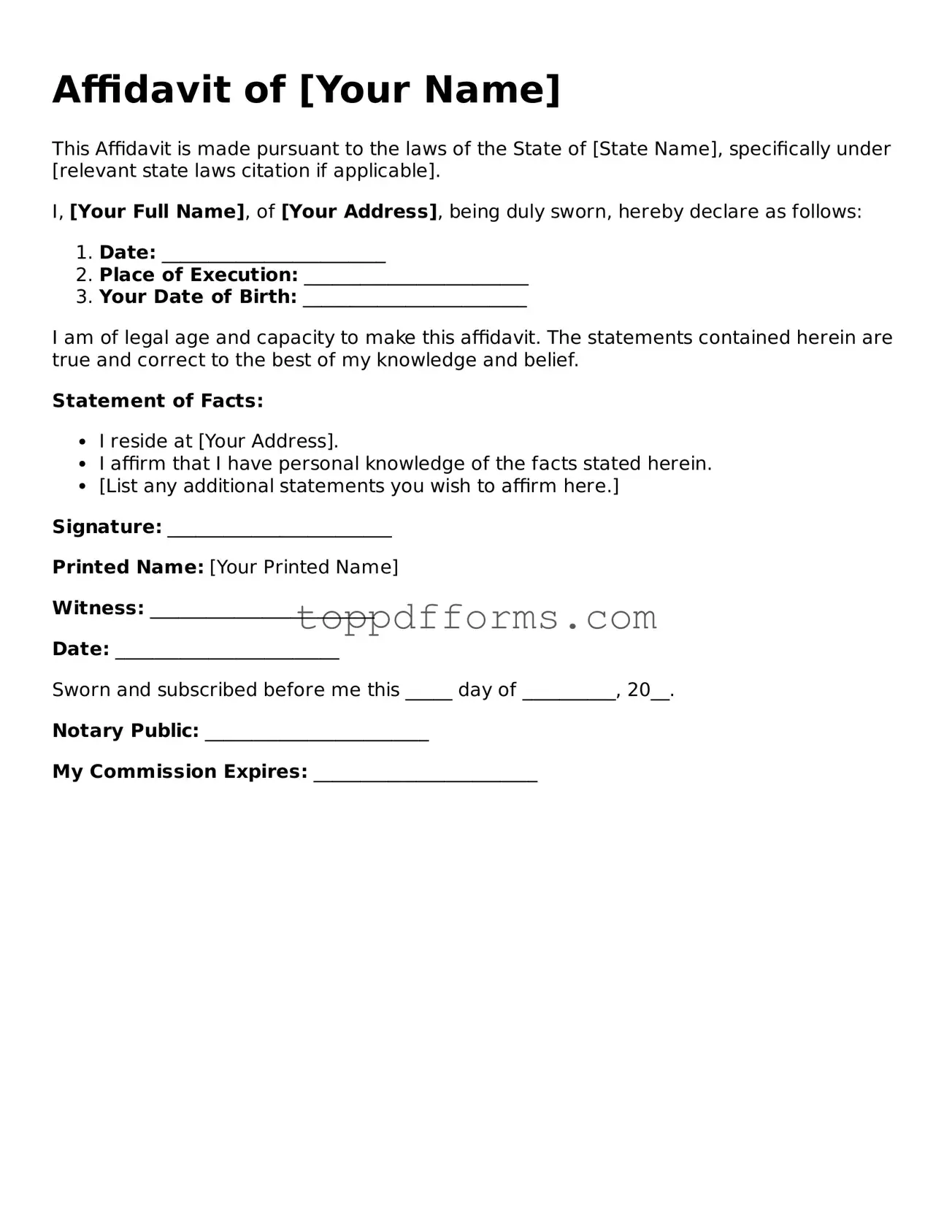Free Affidavit Template
Things You Should Know About This Form
What is an affidavit?
An affidavit is a written statement made under oath, typically used in legal proceedings. It serves as a way for individuals to present facts in a formal manner, allowing them to assert their truthfulness regarding specific information. Affidavits are often used to support claims or defenses in court cases, and they can be critical in various legal contexts, including family law, property disputes, and immigration matters. The individual making the affidavit, known as the affiant, must sign the document in the presence of a notary public or another authorized official to ensure its validity.
When is an affidavit necessary?
Affidavits are necessary in situations where a party needs to provide evidence or support for a claim without appearing in person. For instance, in family law cases, an affidavit may be required to establish the circumstances surrounding child custody or support. In civil litigation, parties may submit affidavits to present witness statements or to affirm the authenticity of documents. Additionally, affidavits can be essential in applications for certain legal processes, such as obtaining a restraining order or filing for bankruptcy. They help streamline legal proceedings by allowing the court to consider factual assertions without requiring live testimony.
How do I prepare an affidavit?
Preparing an affidavit involves several key steps. First, clearly identify the purpose of the affidavit and the facts that need to be included. It is crucial to write in a straightforward manner, focusing on relevant details. The affidavit should start with a title, such as "Affidavit of [Your Name]," followed by a statement affirming your identity and your understanding of the oath. After outlining the facts, conclude with a statement affirming that the information provided is true to the best of your knowledge. Finally, sign the affidavit in front of a notary public or an authorized official, who will then add their signature and seal to validate the document.
Can an affidavit be challenged or contested?
Yes, an affidavit can be challenged in court. Opposing parties may contest the accuracy or credibility of the information presented. Common grounds for contesting an affidavit include allegations of falsehood, lack of personal knowledge, or improper notarization. If an affidavit is deemed unreliable, a court may choose to disregard it entirely or give it less weight in its decision-making process. It is essential for the affiant to ensure that all statements made are truthful and supported by evidence, as providing false information in an affidavit can lead to serious legal consequences, including charges of perjury.
PDF Overview
| Fact Name | Description |
|---|---|
| Definition | An affidavit is a written statement confirmed by oath or affirmation, used as evidence in court. |
| Purpose | Affidavits are often used to provide facts in legal proceedings, such as supporting documents in court cases. |
| State-Specific Forms | Each state may have its own specific affidavit form. For example, in California, the governing law is found under California Code of Civil Procedure Section 2015.5. |
| Requirements | Typically, an affidavit must be signed in the presence of a notary public or another authorized official to ensure its validity. |
Common mistakes
Filling out an Affidavit form can be a straightforward process, but many people encounter pitfalls that can lead to complications. One common mistake is failing to provide accurate information. When individuals rush through the form or assume they know the details, they might inadvertently include incorrect dates, names, or other critical data. This can undermine the credibility of the affidavit and may even lead to legal consequences.
Another frequent error is neglecting to sign the affidavit in the presence of a notary public. An affidavit is a sworn statement, and it must be signed under oath. If someone fills out the form but forgets this crucial step, the document may not hold any legal weight. It’s essential to remember that the notary's role is to verify the identity of the signer and witness the signing process, ensuring the affidavit is valid.
People often overlook the importance of clarity and completeness in their statements. An affidavit should be clear and concise, presenting facts in an organized manner. When individuals use vague language or omit necessary details, it can lead to misunderstandings or misinterpretations. Each statement should be specific and directly related to the matter at hand, ensuring that the reader can easily grasp the intended message.
Lastly, many individuals forget to review their affidavits before submission. A final check can catch typographical errors, missing information, or unclear statements. Taking the time to proofread the document can make a significant difference in its effectiveness. Remember, a well-prepared affidavit not only reflects professionalism but also strengthens the case being presented.
Common Documents
Ca Reg 262 - Keeping a copy of the completed REG 262 form can be useful for your personal records.
The Texas Motorcycle Bill of Sale form is a crucial document used to transfer ownership of a motorcycle from one party to another in Texas. This form protects both the buyer and seller by providing a clear record of the transaction. For those looking for a template to assist with this process, check out PDF Templates to ensure a smooth transfer by filling out the form accurately.
Fedex Direct Signature Required - Having your neighbor sign can provide additional security for your package.
